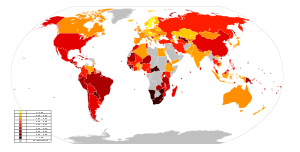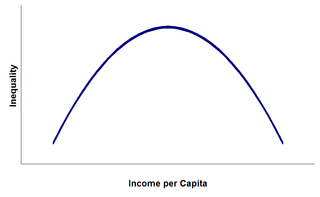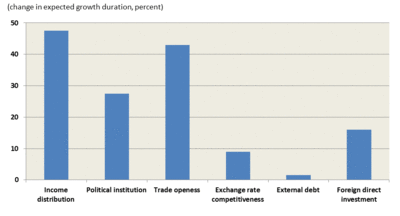Ekonomik eşitsizlik

Ekonomik eşitsizlik bir gruptaki bireylerin, bir popülasyonu oluşturan grupların ya da ülkelerin arasındaki ekonomik refah seviyesindeki farklılıkların bulunması durumunu tanımlar. Ekonomik eşitsizlik ifadesi gelir eşitsizliği, servet eşitsizliği, ya da zenginlik boşluğu olarak da ifade edilebilir. Ekonomistler genellikle ekonomik eşitsizliğe üç kriteri ölçü alarak yaklaşır: servet, gelirve tüketim.[1] Ekonomik eşitsizlik sorunu eşitlik, eşitlik çıktısı, ve eşitlik fırsatı kavramları ile ilişkilidir.[2]
Ekonomik eşitsizlik, toplumlar, tarihsel dönemler, ekonomik yapılar ve ekonomik sistemler arasında değişiklikler gösterir. Bu eşitsizlik, gelirin ya da servetin herhangi bir periyottaki yatay seyri ve gelir ya da servetin uzun süreler içerisindeki değişimi anlamını taşır.[3] Ekonomik eşitsizliği ölçmek için birçok sayısal endeks mevcut olup en yaygın olarak kullanılan ise Gini katsayısı'dır.
Bazı çalışmalar, ekonomik eşitsizliğin toplumsal bir sorun olduğunu ortaya koymuştur[4] Örneğin, Yüksek değerdeki eşitsizlik yıkıcı olabilir,[5][6] çünkü bu eşitsizlik uzun vadeli büyümeye engel olacaktır.[7][8][9] Yüksek değerdeki gelir eşitliği de aynı şekilde yıkıcıdır, çünkü verimliliği azaltır, risk alma ve servet edinme isteğini köreltir.[10][11][12][13]
Eşitsizliğin deneysel (amprik) ölçümü
Ekonomistler, ekonomik dağılımı ölçerken genellikle üç metriği dikkate alır: servet, gelir ve tüketim.[1] Profesyonel bir uzmanın öğrencilik döneminde düşük serveti ve düşük geliri olabilir, ve kariyer sürecinde düşük servet ve yüksek gelir, kariyer sonrasında ise yüksek servet ve düşük geliri olur. İnsanların tercihleri kazançlarını hemen tüketmeyi ya da tüketimi geleceğe saklama alternatifini belirler. Bu ayrım ekonomi seviyesinde ayrıca önemlidir:
- Bazı ülkelerin yüksek derece gelir eşitsizliği ve buna kıyasla düşük derecede servet eşitsizliği vardır - örneğin; Japonya ve İtalya[1]
- Bazı ülkelerin nispeten düşük derecede gelir eşitsizliği ancak buna kıyasla yüksek derecede servet eşitsizliği vardır - örneğin; İsveç ve Danimarka[1]
Ölçümler
Küresel servet dağılımı tahminleri
| The following table displays the wealth patterns within countries. The table was created from information provided by the Credit Suisse, Research Institute's "Global Wealth Databook", published 2013.[14] | |||||||||||||||||||||||||||||||||||||||||||||||||||||||||||||||||||||||||||||||||||||||||||||||||||||||||||||||||||||||||||||||||||||||||||||||||||||||||||||||||||||||||||||||||||||||||||||||||||||||||||||||||||||||||||||||||||||||||||||||||||||||||||||||||||||||||||||||||||||||||||||||||||||||||||||||||||||||||||||||||||||||||||||||||||||||||||||||||||||||||||||||||||||||||||||||||||||||||||||||||||||||||||||||||||||||||||||||||||||||||||||||||||||||||||||||||||||||||||||||||||||||||||||||||||||||||||||||||||||||||||||||||||||||||||||||||||||||||||||||||||||||||||||||||||||||||||||||||||||||||||||||||||||||||||||||||||||||||||||||||||||||||||||||||||||||||||||||||||||||||||||||||||||||||||||||||||||||||||||||||||||||||||||||||||||||||||||||||||||||||||||||||||||||||||||||||||||||||||||||||||||||||||||||||||||||||||||||||||||||||||||||||||||||||||||||||||||||||||||||||||||||||||||||||||||||||||||||||||||||||||||||||||||||||||||||||||||||||||||||||||||||||||||||||||||||||||||||||||||||
|---|---|---|---|---|---|---|---|---|---|---|---|---|---|---|---|---|---|---|---|---|---|---|---|---|---|---|---|---|---|---|---|---|---|---|---|---|---|---|---|---|---|---|---|---|---|---|---|---|---|---|---|---|---|---|---|---|---|---|---|---|---|---|---|---|---|---|---|---|---|---|---|---|---|---|---|---|---|---|---|---|---|---|---|---|---|---|---|---|---|---|---|---|---|---|---|---|---|---|---|---|---|---|---|---|---|---|---|---|---|---|---|---|---|---|---|---|---|---|---|---|---|---|---|---|---|---|---|---|---|---|---|---|---|---|---|---|---|---|---|---|---|---|---|---|---|---|---|---|---|---|---|---|---|---|---|---|---|---|---|---|---|---|---|---|---|---|---|---|---|---|---|---|---|---|---|---|---|---|---|---|---|---|---|---|---|---|---|---|---|---|---|---|---|---|---|---|---|---|---|---|---|---|---|---|---|---|---|---|---|---|---|---|---|---|---|---|---|---|---|---|---|---|---|---|---|---|---|---|---|---|---|---|---|---|---|---|---|---|---|---|---|---|---|---|---|---|---|---|---|---|---|---|---|---|---|---|---|---|---|---|---|---|---|---|---|---|---|---|---|---|---|---|---|---|---|---|---|---|---|---|---|---|---|---|---|---|---|---|---|---|---|---|---|---|---|---|---|---|---|---|---|---|---|---|---|---|---|---|---|---|---|---|---|---|---|---|---|---|---|---|---|---|---|---|---|---|---|---|---|---|---|---|---|---|---|---|---|---|---|---|---|---|---|---|---|---|---|---|---|---|---|---|---|---|---|---|---|---|---|---|---|---|---|---|---|---|---|---|---|---|---|---|---|---|---|---|---|---|---|---|---|---|---|---|---|---|---|---|---|---|---|---|---|---|---|---|---|---|---|---|---|---|---|---|---|---|---|---|---|---|---|---|---|---|---|---|---|---|---|---|---|---|---|---|---|---|---|---|---|---|---|---|---|---|---|---|---|---|---|---|---|---|---|---|---|---|---|---|---|---|---|---|---|---|---|---|---|---|---|---|---|---|---|---|---|---|---|---|---|---|---|---|---|---|---|---|---|---|---|---|---|---|---|---|---|---|---|---|---|---|---|---|---|---|---|---|---|---|---|---|---|---|---|---|---|---|---|---|---|---|---|---|---|---|---|---|---|---|---|---|---|---|---|---|---|---|---|---|---|---|---|---|---|---|---|---|---|---|---|---|---|---|---|---|---|---|---|---|---|---|---|---|---|---|---|---|---|---|---|---|---|---|---|---|---|---|---|---|---|---|---|---|---|---|---|---|---|---|---|---|---|---|---|---|---|---|---|---|---|---|---|---|---|---|---|---|---|---|---|---|---|---|---|---|---|---|---|---|---|---|---|---|---|---|---|---|---|---|---|---|---|---|---|---|---|---|---|---|---|---|---|---|---|---|---|---|---|---|---|---|---|---|---|---|---|---|---|---|---|---|---|---|---|---|---|---|---|---|---|---|---|---|---|---|---|---|---|---|---|---|---|---|---|---|---|---|---|---|---|---|---|---|---|---|---|---|---|---|---|---|---|---|---|---|---|---|---|---|---|---|---|---|---|---|---|---|---|---|---|---|---|---|---|---|---|---|---|---|---|---|---|---|---|---|---|---|---|---|---|---|---|---|---|---|---|---|---|---|---|---|---|---|---|---|---|---|---|---|---|---|---|---|---|---|---|---|---|---|---|---|---|---|---|---|---|---|---|---|---|---|---|---|---|---|---|---|---|---|---|---|---|---|---|---|---|---|---|---|---|---|---|---|---|---|---|---|---|---|---|---|---|---|---|---|---|---|---|---|---|---|---|---|---|---|---|---|---|---|---|---|---|---|---|---|---|---|---|---|---|---|---|---|---|---|---|---|---|---|---|---|---|---|---|---|---|---|---|---|---|---|---|---|---|---|---|---|---|---|---|---|---|---|---|---|---|---|---|---|---|---|---|---|---|---|---|---|---|---|---|---|---|---|---|---|---|---|---|---|---|---|---|---|---|---|---|---|---|---|---|---|---|---|---|---|---|---|---|---|---|---|---|---|---|---|---|---|---|---|---|---|---|---|---|---|---|---|---|---|---|---|---|---|---|---|---|---|---|---|---|---|---|---|---|---|---|---|---|---|---|---|---|---|---|---|---|---|---|---|---|---|---|---|---|---|---|---|---|---|---|---|---|---|---|---|---|---|---|---|---|---|---|---|---|---|---|---|---|---|---|---|---|---|---|---|---|---|---|---|---|
| |||||||||||||||||||||||||||||||||||||||||||||||||||||||||||||||||||||||||||||||||||||||||||||||||||||||||||||||||||||||||||||||||||||||||||||||||||||||||||||||||||||||||||||||||||||||||||||||||||||||||||||||||||||||||||||||||||||||||||||||||||||||||||||||||||||||||||||||||||||||||||||||||||||||||||||||||||||||||||||||||||||||||||||||||||||||||||||||||||||||||||||||||||||||||||||||||||||||||||||||||||||||||||||||||||||||||||||||||||||||||||||||||||||||||||||||||||||||||||||||||||||||||||||||||||||||||||||||||||||||||||||||||||||||||||||||||||||||||||||||||||||||||||||||||||||||||||||||||||||||||||||||||||||||||||||||||||||||||||||||||||||||||||||||||||||||||||||||||||||||||||||||||||||||||||||||||||||||||||||||||||||||||||||||||||||||||||||||||||||||||||||||||||||||||||||||||||||||||||||||||||||||||||||||||||||||||||||||||||||||||||||||||||||||||||||||||||||||||||||||||||||||||||||||||||||||||||||||||||||||||||||||||||||||||||||||||||||||||||||||||||||||||||||||||||||||||||||||||||||||
Nedenler
Toplum içindeki ekonomik eşitsizlik için pek çok neden vardır. Son dönemlerdeki gelir eşitsizliğindeki artışın - OECD ülkeleri için -temel nedeni maaş ve ücretlerdeki eşitsizliktir.[15]
Ekonomik kalkınma

Finansal endüstri
Jamie Galbraith geniş finans sektörüne sahip ülkelerde ekonomik eşitsizliğin daha yüksek olduğunu ve finans sektörü hacmi ile eşitsizlik arasındaki bağlantının tesadüf olmadığını savunur.[16][17]
Etkiler
_(2).jpg)
Ekonomik büyüme

Kaynakça
- 1 2 3 4 "A three-headed hydra". The Economist. 16 July 2014. 13 Kasım 2015 tarihinde kaynağından arşivlendi. http://web.archive.org/web/20151113123047/http://www.economist.com:80/blogs/freeexchange/2014/07/measuring-inequality.
- ↑ Fletcher, Michael A. (March 10, 2013). "Research ties economic inequality to gap in life expectancy". Washington Post. http://www.washingtonpost.com/business/economy/research-ties-economic-inequality-to-gap-in-life-expectancy/2013/03/10/c7a323c4-7094-11e2-8b8d-e0b59a1b8e2a_story.html. Erişim tarihi: March 23, 2013.
- ↑ Wojciech Kopczuk, Emmanuel Saez, and Jae Song find that "most of the increase in the variance of ... annual earnings is due to increases in the variance of ... permanent earnings with modest increases in the variance of transitory ... earnings."
- ↑ Wilkinson, Richard; Pickett, Kate (2009). The Spirit Level: Why More Equal Societies Almost Always Do Better. Allen Lane. s. 352. ISBN 978-1-84614-039-6.
- ↑ Easterly, W (2007). "Inequality does cause underdevelopment: Insights from a new instrument" (PDF). Journal of Development Economics 84 (2): 755–76. DOI:10.1016/j.jdeveco.2006.11.002. http://www.biu.ac.il/soc/ec/students/teach/509/data/EasterlyJDE2007.pdf.
- ↑ Castells-Quintana, David; Royuela, Vicente (2012). "Unemployment and long-run economic growth: The role of income inequality and urbanisation". Investigaciones Regionales 12 (24): 153–73. http://diposit.ub.edu/dspace/bitstream/2445/33140/1/617293.pdf. Erişim tarihi: 17 October 2013.
- ↑ Stiglitz, J (2009). "The global crisis, social protection and jobs" (PDF). International Labour Review 148: 1–2. DOI:10.1111/j.1564-913x.2009.00046.x. http://www.ilo.org/public/english/revue/download/pdf/s1_stiglitz2009_1_2.pdf.
- ↑ Temple, J (1999). "The New Growth Evidence" (PDF). Journal of Economic Literature 37 (1): 112–56. DOI:10.1257/jel.37.1.112. http://www.fadep.org/documentosfadep_archivos/D-65_THE_NEW_GROWTH_EVIDENCE.pdf.
- ↑ Clarke, G (1995). "More evidence on income distribution and growth" (PDF). Journal of Development Economics 47: 403–27. DOI:10.1016/0304-3878(94)00069-o. http://www-wds.worldbank.org/servlet/WDSContentServer/IW3P/IB/1992/12/01/000009265_3961003191831/Rendered/PDF/multi0page.pdf.
- ↑ Freeman, Richard B. (2012-04-01). "Optimal inequality for economic growth, stability, and shared prosperity: the economics behind the Wall Street Occupiers Protest?". Insights 11: 5–11. http://insights.unimelb.edu.au/vol11/01_Freeman.html. Erişim tarihi: 30 January 2016.
- ↑ Friedman, Mark (2008-03-01). "Living Wage and Optimal Inequality in a Sarkarian Framework". Review of Social Economy (Taylor & Francis) 66 (1): 93–111. DOI:10.1080/00346760701668479. http://online.southcentral.edu/students/instructors/MFMyROSEarticle.pdf. Erişim tarihi: 30 January 2016.
- ↑ Edsall, Thomas B. (2014-03-04). "Just Right Inequality". The New York Times. http://www.nytimes.com/2014/03/05/opinion/edsall-just-right-inequality.html?_r=0. Erişim tarihi: 2016-01-31.
- ↑ Becker, Gary S.; Murphy, Kevin M. (May 2007). "The Upside of Income Inequality". The America. 1 Ekim 2014 tarihinde kaynağından arşivlendi. http://web.archive.org/web/20141001102752/http://www.american.com:80/archive/2007/may-june-magazine-contents/the-upside-of-income-inequality/. Erişim tarihi: January 8, 2014.
- ↑ Credit Suisse, Research Institute – Global Wealth Databook 2013
- ↑ Gurría, Angel (December 5, 2011).
- ↑ James K. Galbraith, Inequality and Instability: A Study of the World Economy Just before the Great Crisis (New York: Oxford University Press, 2012).
- ↑ Stiglitz, Joseph E. (June 4, 2012).
- ↑ Berg, Andrew G.; Ostry, Jonathan D. (2011). "Equality and Efficiency". Finance and Development (International Monetary Fund) 48 (3). http://www.imf.org/external/pubs/ft/fandd/2011/09/berg.htm. Erişim tarihi: July 13, 2014.
- ↑ Andrew Berg and Jonathan Ostry. (2011) "Inequality and Unsustainable Growth: Two Sides of the Same Coin" IMF Staff Discussion Note No. SDN/11/08 (International Monetary Fund)
Daha fazla kaynak:
- Kitaplar
- Atkinson, Anthony B.; Bourguignon, François (2000). Handbook of income distribution. Amsterdam New York: Elvesier. ISBN 9780444816313.Handbook of income distribution. Amsterdam New York: Elvesier. ISBN 9780444816313.
- Atkinson, Anthony B. (2015). Inequality: What Can Be Done? Cambridge, Massachusetts: Harvard University Press. ISBN 0674504763
- Barro, Robert J.; Sala-i-Martin, Xavier (2003) [1995]. Economic growth (2nd bas.). Massachusetts: MIT Press. ISBN 9780262025539.Economic growth (2nd ed.). Massachusetts: MIT Press. ISBN 9780262025539.
- Deneulin, Séverine; Shahani, Lila (2009). An introduction to the human development and capability approach freedom and agency. Sterling, Virginia Ottawa, Ontario: Earthscan International Development Research Centre. ISBN 9781844078066.An introduction to the human development and capability approach freedom and agency. Sterling, Virginia Ottawa, Ontario: Earthscan International Development Research Centre. ISBN 9781844078066.
- Giddens, Anthony; Diamond, Patrick (2005). The new egalitarianism. Cambridge, UK Malden, Massachusetts: Polity. ISBN 9780745634319.The new egalitarianism. Cambridge, UK Malden, Massachusetts: Polity. ISBN 9780745634319.
- Gilens, Martin (2012). Affluence and influence: Economic inequality and political power in America. Princeton, New Jersey New York: Princeton University Press Russell Sage Foundation. ISBN 9780691162423.Affluence and influence: Economic inequality and political power in America. Princeton, New Jersey New York: Princeton University Press Russell Sage Foundation. ISBN 9780691162423.
- Lambert, Peter J. (2001). The distribution and redistribution of income (3rd bas.). Manchester New York New York: Manchester University Press Palgrave. ISBN 9780719057328.The distribution and redistribution of income (3rd ed.). Manchester New York New York: Manchester University Press Palgrave. ISBN 9780719057328.
- Lynn, Richard; Vanhanen, Tatu (2002). IQ and the wealth of nations. Westport, Connecticut: Praeger. ISBN 9780275975104.IQ and the wealth of nations. Westport, Connecticut: Praeger. ISBN 9780275975104.
- Merino, Noël, ed. (2016). Income inequality. Opposing Viewpoints Series. Farmington Hills, Michigan: Greenhaven Press. ISBN 9780737775259.Income inequality. Opposing Viewpoints Series. Farmington Hills, Michigan: Greenhaven Press. ISBN 9780737775259.
- Page, Benjamin I.; Jacobs, Lawrence R. (2009). Class war?: What Americans really think about economic inequality. Chicago: University of Chicago Press. ISBN 9780226644554.Class war?: What Americans really think about economic inequality. Chicago: University of Chicago Press. ISBN 9780226644554.
- Salverda, Wiemer; Nolan, Brian; Smeeding, Timothy M. (2009). The Oxford handbook of economic inequality. Oxford New York: Oxford University Press. ISBN 9780199231379.The Oxford handbook of economic inequality. Oxford New York: Oxford University Press. ISBN 9780199231379.
- Schmidtz, David (2006). The elements of justice. Cambridge New York: Cambridge University Press. ISBN 9780521539364.The elements of justice. Cambridge New York: Cambridge University Press. ISBN 9780521539364.
- Sen, Amartya (1999). Development as Freedom. New York: Oxford University Press. ISBN 9780198297581.Development as Freedom. New York: Oxford University Press. ISBN 9780198297581.
- Sen, Amartya; Foster, James E. (1997). On economic inequality. Radcliffe Lectures. Oxford New York: Clarendon Press Oxford University Press. ISBN 9780198281931.On economic inequality. Radcliffe Lectures. Oxford New York: Clarendon Press Oxford University Press. ISBN 9780198281931.
- von Braun, Joachim; Diaz-Bonilla, Eugenio (2008). Globalization of food, and agriculture, and the poor. New Delhi Washington D.C: Oxford University Press International Food Policy Research Institute. ISBN 9780195695281.Globalization of food, and agriculture, and the poor. New Delhi Washington D.C: Oxford University Press International Food Policy Research Institute. ISBN 9780195695281.
- von Mises, Ludwig (1998). "Chapter 35: The welfare principle versus the market principle". von Mises, Ludwig. Human action: a treatise on economics. Auburn, Alabama: Ludwig Von Mises Institute. s. 819–50. http://oll.libertyfund.org/titles/1895."Chapter 35: The welfare principle versus the market principle". In von Mises, Ludwig. Human action: a treatise on economics. Auburn, Alabama: Ludwig Von Mises Institute. pp. 819–50. ISBN 9780945466246
- Wilkinson, Richard G. (2005). The impact of inequality: how to make sick societies healthier. London: Routledge. ISBN 9780415372695.The impact of inequality: how to make sick societies healthier. London: Routledge. ISBN 9780415372695.
- Wilkinson, Richard G.; Pickett, Kate (2009). The spirit level: why more equal societies almost always do better. London: Allen Lane. ISBN 9781846140396.The spirit level: why more equal societies almost always do better. London: Allen Lane. ISBN 9781846140396.
- Makaleler
- Alesina, Alberto; Di Tella, Rafael; MacCulloch, Robert (August 2004). "Inequality and Happiness: Are Americans and Europeans Different?". Journal of Public Economics (Elsevier) 88 (9–10): 2009–42. DOI:10.1016/j.jpubeco.2003.07.006. http://dx.doi.org/10.1016/j.jpubeco.2003.07.006."Inequality and Happiness: Are Americans and Europeans Different?". Journal of Public Economics (Elsevier) 88 (9–10): 2009–42. doi:10.1016/j.jpubeco.2003.07.006.
- Andersen, Robert; Fetner, Tina (October 2008). "Economic inequality and intolerance: Attitudes toward homosexuality in 35 democracies". American Journal of Political Science (Midwest Political Science Association) 52 (4): 942–58. DOI:10.1111/j.1540-5907.2008.00352.x. JSTOR 25193859. http://dx.doi.org/10.1111/j.1540-5907.2008.00352.x."Economic inequality and intolerance: Attitudes toward homosexuality in 35 democracies". American Journal of Political Science (Midwest Political Science Association) 52 (4): 942–58. doi:10.1111/j.1540-5907.2008.00352.x. JSTOR 25193859.
- Barro, Robert J. (May 1991). "Economic growth in a cross section of countries". Quarterly Journal of Economics (Oxford Journals) 106 (2): 407–43. DOI:10.2307/2937943. http://dx.doi.org/10.2307/2937943."Economic growth in a cross section of countries". Quarterly Journal of Economics (Oxford Journals) 106 (2): 407–43. doi:10.2307/2937943.
- Barro, Robert J. (March 2000). "Inequality and growth in a panel of countries". Journal of Economic Growth (Springer) 5 (1): 5–32. DOI:10.1023/A:1009850119329. http://dx.doi.org/10.1023/A:1009850119329."Inequality and growth in a panel of countries". Journal of Economic Growth (Springer) 5 (1): 5–32. doi:10.1023/A:1009850119329.
- Fukuda-Parr, Sakiko (2003). "The human development paradigm: Operationalizing Sen's ideas on capabilities". Feminist Economics (Taylor and Francis) 9 (2-3): 301–17. DOI:10.1080/1354570022000077980. http://dx.doi.org/10.1080/1354570022000077980."The human development paradigm: Operationalizing Sen's ideas on capabilities". Feminist Economics (Taylor and Francis) 9 (2-3): 301–17. doi:10.1080/1354570022000077980.
- Galor, Oded; Zeira, Joseph (January 1993). "Income distribution and macroeconomics". Review of Economic Studies (Oxford Journals) 60 (1): 35–52. DOI:10.2307/2297811. JSTOR 2297811. http://dx.doi.org/10.2307/2297811."Income distribution and macroeconomics". Review of Economic Studies (Oxford Journals) 60 (1): 35–52. doi:10.2307/2297811. JSTOR 2297811.
- Kaldor, Nicholas (1955). "Alternative theories of distribution". Review of Economic Studies (Oxford Journals) 23 (2): 83–100. DOI:10.2307/2296292. JSTOR 2296292. http://dx.doi.org/10.2307/2296292."Alternative theories of distribution". Review of Economic Studies (Oxford Journals) 23 (2): 83–100. doi:10.2307/2296292. JSTOR 2296292.
- Kenworthy, Lane (November–December 2010). "Rising inequality, public policy, and America's poor". Challenge (Taylor and Francis) 53 (6): 93–109. DOI:10.2753/0577-5132530606. JSTOR 27896630. http://dx.doi.org/10.2753/0577-5132530606."Rising inequality, public policy, and America's poor". Challenge (Taylor and Francis) 53 (6): 93–109. doi:10.2753/0577-5132530606. JSTOR 27896630. Pdf.
- Lagerlöf, Nils-Petter (August 2005). "Sex, equality, and growth". Canadian Journal of Economics (Wiley) 38 (3): 807–31. DOI:10.1111/j.0008-4085.2005.00303.x. http://dx.doi.org/10.1111/j.0008-4085.2005.00303.x."Sex, equality, and growth". Canadian Journal of Economics (Wiley) 38 (3): 807–31. doi:10.1111/j.0008-4085.2005.00303.x. Similar paper from August 2002: Sex, equality, and growth (in that order)
- Maavak, Mathew (December 2012). "Class warfare, anarchy and the future society". Journal of Futures Studies (Tamkang University Press) 17 (2): 15–36. http://www.jfs.tku.edu.tw/?page_id=554."Class warfare, anarchy and the future society". Journal of Futures Studies (Tamkang University Press) 17 (2): 15–36. Pdf.
- García-Peñalosa, Cecilia; Turnovsky, Stephen J. (March 2007). "Growth, income inequality, and fiscal policy: What are the relevant trade-offs?". Journal of Money, Credit and Banking (Wiley) 39 (2-3): 369–94. DOI:10.1111/j.0022-2879.2007.00029.x. http://dx.doi.org/10.1111/j.0022-2879.2007.00029.x."Growth, income inequality, and fiscal policy: What are the relevant trade-offs?". Journal of Money, Credit and Banking (Wiley) 39 (2-3): 369–94. doi:10.1111/j.0022-2879.2007.00029.x. Pdf.
- Pigou, Arthur C. (1932) [1920], "Part I, Chapter VIII: Economic welfare and changes in the distribution of the national dividend (section I.VIII.3)", The economics of welfare (4th bas.), London: Macmillan and Co., OCLC 302702, http://www.econlib.org/library/NPDBooks/Pigou/pgEW8.html.), London: Macmillan and Co., OCLC 302702.
- Sala-i-Martin, Xavier (May 2006). "The world distribution of income: Falling poverty and ... convergence, period". Quarterly Journal of Economics (Oxford Journals) 121 (2): 351–97. DOI:10.1162/qjec.2006.121.2.351. JSTOR 25098796. http://dx.doi.org/10.1162/qjec.2006.121.2.351."The world distribution of income: Falling poverty and ... convergence, period". Quarterly Journal of Economics (Oxford Journals) 121 (2): 351–97. doi:10.1162/qjec.2006.121.2.351. JSTOR 25098796.
- Seguino, Stephanie (1 July 2000). "Gender inequality and economic growth: A cross-country analysis". World Development (ScienceDirect) 28 (7): 1211–30. DOI:10.1016/S0305-750X(00)00018-8. http://dx.doi.org/10.1016/S0305-750X(00)00018-8."Gender inequality and economic growth: A cross-country analysis". World Development (ScienceDirect) 28 (7): 1211–30. doi:10.1016/S0305-750X(00)00018-8.
- Smeeding, Timothy M.; Thompson, Jeffrey P. (2011), "Recent trends in income inequality", Who loses in the downturn? Economic crisis, employment and income distribution, Research in Labor Economics, Volume 32, Bingley, UK: Emerald Group Publishing Limited, ss. 1–50, ISBN 9780857247490.Economic crisis, employment and income distribution, Research in Labor Economics, Volume 32, Bingley, UK: Emerald Group Publishing Limited, pp. 1–50, ISBN 9780857247490. Pdf.
- Also available as Smeeding, Timothy M.; Thompson, Jeffrey P. (2011). "Recent trends in income inequality (book chapter)". Research in Labor Economics (book series) (Emerald Group Publishing Limited) 32: 1–50. DOI:10.1108/S0147-9121(2011)0000032004. http://dx.doi.org/10.1108/S0147-9121(2011)0000032004."Recent trends in income inequality (book chapter)". Research in Labor Economics (book series) (Emerald Group Publishing Limited) 32: 1–50. doi:10.1108/S0147-9121(2011)0000032004.
- Solow, Robert M. (February 1956). "A contribution to the theory of economic growth". Quarterly Journal of Economics (Oxford Journals) 70 (1): 65–94. DOI:10.2307/1884513. JSTOR 1884513. http://dx.doi.org/10.2307/1884513."A contribution to the theory of economic growth". Quarterly Journal of Economics (Oxford Journals) 70 (1): 65–94. doi:10.2307/1884513. JSTOR 1884513. Pdf.
- Svizzero, Serge; Tisdell, Clem (2003). "Income inequality between skilled individuals". International Journal of Social Economics (Emerald) 30 (11): 1118–30. DOI:10.1108/03068290310497486. http://dx.doi.org/10.1108/03068290310497486."Income inequality between skilled individuals". International Journal of Social Economics (Emerald) 30 (11): 1118–30. doi:10.1108/03068290310497486.
- Çalışmalar
- Burkhauser, R. V.; Feng, S.; Jenkins, S. P. (2009). "Using the P90/P10 index to measure US inequality trends with Current Population Survey data: A view from inside the Census Bureau vaults". Review of Income and Wealth 55 (1): 166–85. DOI:10.1111/j.1475-4991.2008.00305.x. http://onlinelibrary.wiley.com/doi/10.1111/j.1475-4991.2008.00305.x/full."Using the P90/P10 index to measure US inequality trends with Current Population Survey data: A view from inside the Census Bureau vaults". Review of Income and Wealth 55 (1): 166–85. doi:10.1111/j.1475-4991.2008.00305.x.
- Dollar, David; Gatti, Roberta (May 1999) (pdf). Gender inequality, income, and growth: Are good times good for women?. Poverty Reduction and Economic Management Network. Washington DC: The World Bank. OCLC 43703722. http://www-wds.worldbank.org/external/default/WDSContentServer/WDSP/IB/2000/09/01/000094946_00081906181732/Rendered/PDF/multi_page.pdf.Gender inequality, income, and growth: Are good times good for women? (pdf). Poverty Reduction and Economic Management Network. Washington DC: The World Bank. OCLC 43703722. Policy research report on gender and development working paper series, no. 1.
- Ravallion, Martin (2005). World Bank, 5 May, Policy Research Working Paper no. WPS 3579, A poverty-inequality trade-off?
- Sawhill, Isabel. "Do We Face a Permanently Divided Society?" The Economics of Inequality, Poverty, and Discrimination in the 21st Century Ed. Robert S. Rycroft. The University of Mary Washington, 2012.
- Smeeding, Timothy and Thompson, Jeffrey. "Inequality in the Great Recession – The Case of the United States". FRDB International Income Inequality Project (July 2011). Working paper.
- Uslaner, Eric.; Mitchell, Brown. (2002). "Inequality, Trust, and Civic Engagement". 1 Haziran 2013 tarihinde kaynağından arşivlendi. http://web.archive.org/web/20130601003357/http://www.bsos.umd.edu:80/gvpt/uslaner/uslanerrussellsage.pdf"Inequality, Trust, and Civic Engagement" (PDF).
- Voitchovsky, Sarah. "The effects of inequality on growth: perspectives from the theoretical literature." Working paper.
Dış bağlantılar
-
 Media related to Economic inequality at Wikimedia Commons
Media related to Economic inequality at Wikimedia Commons - Levy, Frank (2008). "Distribution of Income". David R. Henderson (ed.). Concise Encyclopedia of Economics (2nd bas.). Indianapolis: Library of Economics and Liberty. ISBN 978-0865976658. OCLC 237794267. http://www.econlib.org/library/Enc/DistributionofIncome.html."Distribution of Income". In David R. Henderson (ed.). Concise Encyclopedia of Economics (2nd ed.). Indianapolis: Library of Economics and Liberty. ISBN 978-0865976658. OCLC 237794267.
- A portal dedicated to the topic of economic inequality
- Small Inequality Measures Calculus (and On-Line Calculator)
- The UC Atlas of Global Inequality explores some aspects of inequality using online, downloadable maps and graphics.
- Population Health Forum website – group seeking to improve health by addressing inequality.
- Russell Sage Foundation. "Social Inequality" (Web page). Working Papers. May 29, 2006 tarihinde kaynağından arşivlendi. https://web.archive.org/web/20060529093606/http://www.russellsage.org/programs/main/inequality/program_view. Erişim tarihi: March 2, 2006."Social Inequality". Working Papers. Archived from the original (Web page) on May 29, 2006. Retrieved March 2, 2006.
- Leigh, A.; Jencks, C. (2005). "Inequality and Health: Long-Run Evidence from a Panel of Countries" (PDF). http://www.nber.org/%7Econfer/2005/si2005/he/leigh.pdf. Erişim tarihi: November 30, 2005."Inequality and Health: Long-Run Evidence from a Panel of Countries" (PDF). Retrieved November 30, 2005.
- Clarkwest, A; Jencks, C. (2003). "Inequality and Mortality in Rich Countries: Who Owns the Null Hypothesis?" (PDF). May 28, 2006 tarihinde kaynağından arşivlendi. https://web.archive.org/web/20060528042212/http://www.popcenter.umd.edu/events/rsf/papers/Jencks.pdf. Erişim tarihi: November 30, 2005."Inequality and Mortality in Rich Countries: Who Owns the Null Hypothesis?" (PDF). Archived from the original (PDF) on May 28, 2006. Retrieved November 30, 2005.
- The Inequality Predicament United Nations Report on the World Social Situation 2005
- Two Americas: One Rich, One Poor? Understanding Income Inequality in the United States
- Has U.S. Income Inequality Really Increased? Accessed 2007-06-11.
- Measuring Trends in Leisure: The Allocation of Time Over Five Decades studies the trade-offs between earning income and enjoying leisure
- Data from the Inequality Survey
- Decreasing Inequality Under Latin America's "Social Democratic" and "Populist" Governments: Is the Difference Real? from the Center for Economic and Policy Research
- Wealth and Poverty: Center for Global Studies at the University of Illinois
- Thomas Piketty's presentation Inequality & Capitalism in the Long-Run based on Capital in the Twenty-First Century
- "Wealth Gap" – A Guide (AP News – January 2014).
- Economic and Social Inequality in Asia and Pacific: 12 Things to Know Asian Development Bank
- As inequality soars, the nervous super rich are already planning their escapes. The Guardian. 23 January 2015.
- Asia’s Wealth Inequality Problem. The Diplomat. October 23, 2015.